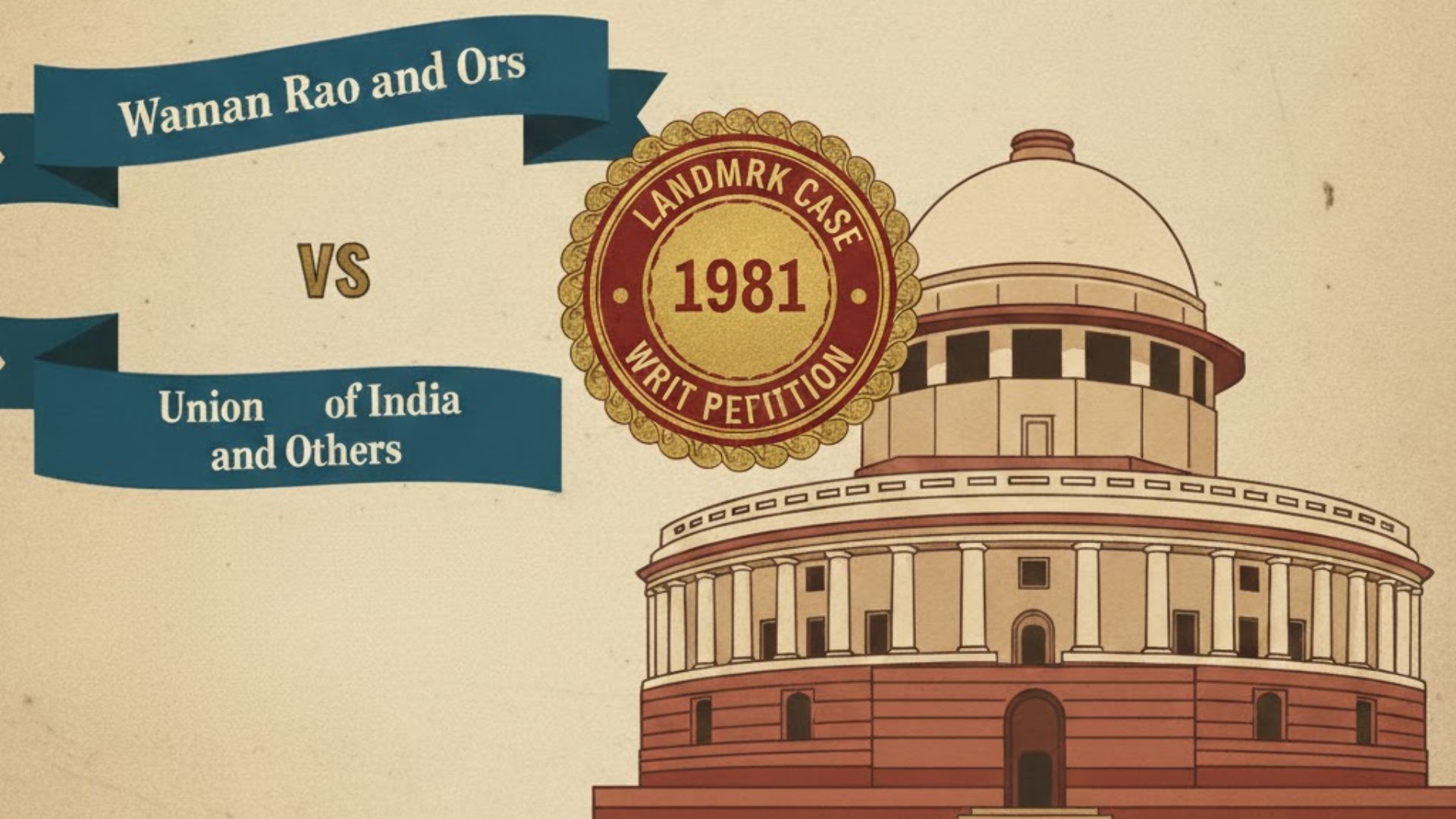
Case Statistics: Waman Rao and Ors vs Union of India and Others
Case Name: Waman Rao and Ors vs Union of India and Others
Court: Supreme Court of India
Case No: Writ Petition Nos. 63, 503-11, 512-33 and 656-60 of 1977; Review Petition Nos. 34, 62-65, 66-72, 75-77, 78-81, 82-84, 85, 86-87, 88, 89-90, 91-92, 93-94, 95, 95-A, 103-107, 110 and 120-30 of 1977
Date of Decision: 13-11-1980
Bench: Y. V. Chandrachud (C.J.), V. R. Krishna Iyer, V. D. Tulzapurkar, P. N. Bhagwati, A. N. Sen (JJ.)
Final Decision: Disposed Of
Citations: (1981) 2 SCC 362; (1981) 2 SCR 1
[Judgment Source]
https://www.courtkutchehry.com/Judgement/Search/AdvancedV2?docid=279266
One-Page Summary
Facts of the Case
The Maharashtra Agricultural Lands (Ceiling on Holdings) Act, 1961 imposed a ceiling on agricultural holdings. This ceiling was lowered through subsequent amendments in 1975 and 1976. The validity of these laws was challenged before the Bombay High Court, which upheld them as they were included in the Ninth Schedule and thus immune from challenge under Articles 14 and 19 during the Emergency. The Court also rejected challenges to Article 31B, holding it supported the basic structure. Appeals to the Supreme Court were dismissed in 1977 during Emergency. After the Emergency was lifted, review petitions and fresh writs were filed challenging Articles 31A, 31B, and unamended 31C as violating the basic structure.
Law Points Raised
1. Whether Articles 31A(1)(a), 31B, and unamended 31C violate the basic structure doctrine.
2. Validity of constitutional amendments introducing these Articles under Article 368.
3. Scope of judicial review over constitutional amendments after Kesavananda Bharati.
4. Whether agrarian reform laws in the Ninth Schedule can override fundamental rights.
5. Impact of the 'family unit' concept in fixing land ceilings.
Acts / Provisions / Articles Referred
• Constitution of India: Articles 13(2), 14, 19, 31, 31A, 31B, 31C, 39, 329, 352, 368
• Constitution (First Amendment) Act, 1951
• Constitution (Forty-second Amendment) Act, 1976
• Maharashtra Agricultural Lands (Ceiling on Holdings) Act, 1961
Judgements Referred
• Kesavananda Bharati v. State of Kerala (1973)
• Dattatraya Govind Mahajan case (1977)
• Minerva Mills Ltd. v. Union of India (1980)
Obiter Dicta
The Court observed that agrarian reform is a matter of legislative policy and courts cannot substitute their economic opinions for that of the legislature. Constitutional amendments must not damage or destroy the basic structure.
Ratio Decidendi
Articles 31A and 31B are valid as they do not damage the basic structure of the Constitution. The unamended Article 31C is valid except the part struck down in Kesavananda Bharati. Ninth Schedule laws enacted before 24 April 1973 are immune from basic structure review; those enacted after are subject to such review.
Final Ruling
The Court upheld the validity of Articles 31A, 31B, and unamended 31C (minus the struck-down portion). It ruled that pre-Kesavananda Ninth Schedule laws are protected from challenge, but post-Kesavananda laws can be reviewed for basic structure violations.
Relevant Paragraph Numbers
Key references: Paras 1-4 (Facts), Paras 10-11 (Legal Framework), Para 36 (Ratio), Para 44 (Final Ruling).
Summary
Waman Rao is a landmark judgment on the application of the basic structure doctrine to the Ninth Schedule. It created a clear demarcation: laws placed in the Ninth Schedule before 24 April 1973 enjoy absolute immunity, while those added after are subject to judicial review. The case reinforced agrarian reform policies while preserving constitutional supremacy.
[Judgment Source]
https://www.courtkutchehry.com/Judgement/Search/AdvancedV2?docid=279266